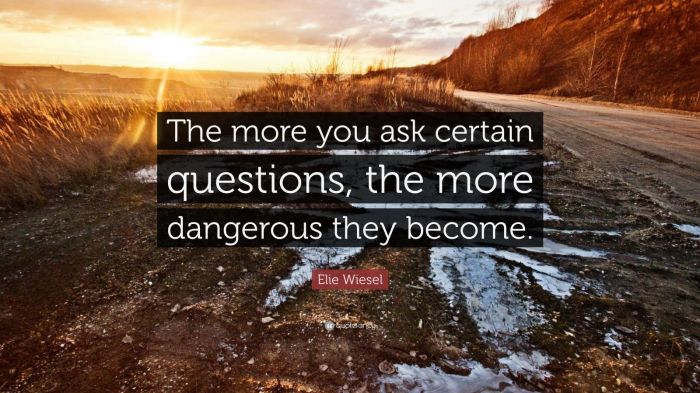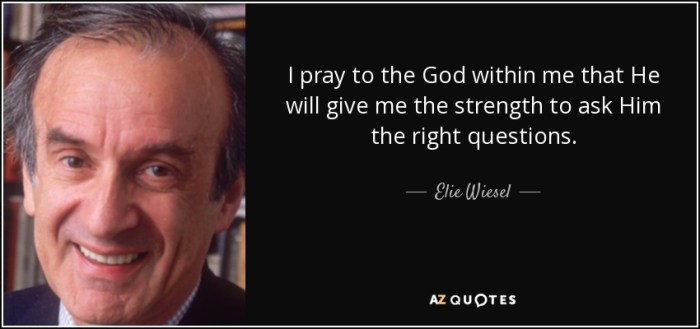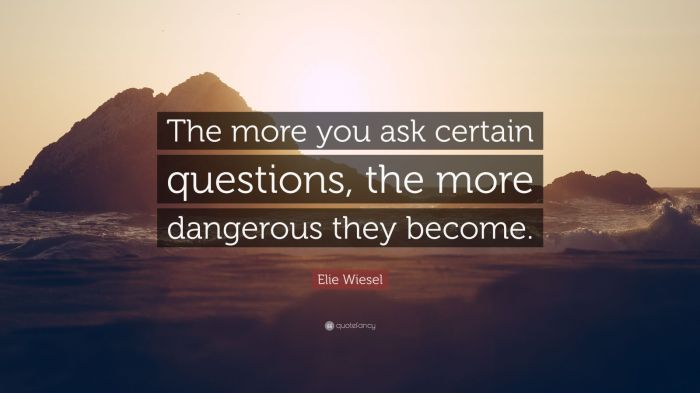Questions to ask about night by elie wiesel – Questions to ask about Elie Wiesel’s “Night” delve into the depths of one of the most harrowing accounts of the Holocaust. This novel, a poignant memoir, raises profound questions about the nature of evil, the resilience of the human spirit, and the importance of bearing witness to history’s darkest chapters.
Through Wiesel’s eyes, we embark on a journey into the abyss of Auschwitz and Buchenwald, confronting the unimaginable horrors that unfolded within those concentration camps. His deeply personal narrative invites us to grapple with the complexities of human nature, the fragility of faith, and the enduring power of memory.
Elie Wiesel’s Personal Experiences

Elie Wiesel’s childhood in Sighet, Transylvania, was marked by a deep faith in God and a love for Jewish traditions. However, his experiences in Auschwitz and Buchenwald during the Holocaust shattered his faith and left him questioning the nature of God and humanity.
These personal experiences profoundly influenced his writing, particularly in his novel “Night,” where he confronts the horrors of the Holocaust and explores the loss of innocence, faith, and humanity.
The Impact of Auschwitz and Buchenwald
- Witnessing the brutality and dehumanization of the camps led Wiesel to question the existence of a benevolent God.
- The loss of his family and community left him feeling isolated and alone.
- The experiences in the camps forced him to confront the darkness within himself and the capacity for evil in humanity.
The Influence on His Writing
- Wiesel’s writing is characterized by a raw and unflinching depiction of the Holocaust’s horrors.
- He uses his personal experiences to explore the themes of loss, suffering, and the search for meaning in the face of adversity.
- His work serves as a powerful testimony to the resilience of the human spirit and the importance of memory.
Themes in “Night”

“Night” explores a range of profound themes that resonate with readers today.
The Loss of Faith
- Wiesel’s experiences in Auschwitz and Buchenwald challenge his belief in a benevolent God.
- The novel depicts the struggle to reconcile the existence of God with the horrors of the Holocaust.
- Wiesel’s loss of faith reflects the broader crisis of faith that many people experienced during the Holocaust.
The Nature of Evil
- “Night” confronts the darkest aspects of human nature.
- The novel explores the capacity for evil and the ways in which it can manifest in individuals and societies.
- Wiesel suggests that evil is not merely a force external to humanity but something that resides within us all.
The Importance of Memory, Questions to ask about night by elie wiesel
- Wiesel’s writing is a testament to the importance of remembering the Holocaust.
- He argues that memory is essential for preventing future atrocities.
- “Night” serves as a reminder of the horrors of the past and a warning against the dangers of hatred and indifference.
Character Analysis
Eliezer
Eliezer, the narrator and protagonist of “Night,” is a young Jewish boy who undergoes a profound transformation throughout the novel.
Development of Character
- Initially, Eliezer is a devout and innocent boy who believes in God and the goodness of humanity.
- His experiences in the camps shatter his faith and innocence, leaving him disillusioned and cynical.
- By the end of the novel, Eliezer has become a survivor who is haunted by the horrors he has witnessed.
Other Significant Characters
- Moishe the Beadle: A wise old man who warns the Jews of Sighet about the dangers of the Nazis.
- Juliek: A fellow prisoner who plays the violin in the camp, providing a brief respite from the horrors.
- Rabbi Eliahu: A spiritual leader who struggles to maintain his faith in God despite the suffering he witnesses.
Literary Devices: Questions To Ask About Night By Elie Wiesel

Wiesel employs a range of literary devices in “Night” to convey the horrors of the Holocaust and explore its themes.
Symbolism
- The night: Represents the darkness and despair of the Holocaust.
- The camp: Symbolizes the dehumanization and suffering endured by the prisoners.
- The violin: Represents the power of art to provide solace and hope in the face of adversity.
Imagery
- Wiesel uses vivid and disturbing imagery to depict the horrors of the Holocaust.
- The novel is filled with descriptions of violence, starvation, and death.
- These images serve to convey the brutality of the camps and the impact it had on the prisoners.
Irony
- Wiesel uses irony to highlight the absurdity and cruelty of the Holocaust.
- For example, the prisoners are forced to sing “The Song of the Jews” as they march to their deaths.
- This irony serves to emphasize the dehumanizing nature of the Nazi regime.
Historical Context
The Holocaust, the genocide of six million Jews by the Nazis during World War II, serves as the historical backdrop for “Night.”
The Setting of Auschwitz and Buchenwald
- Auschwitz and Buchenwald were two of the most notorious Nazi concentration camps.
- The novel depicts the horrors of these camps in graphic detail.
- The setting of the novel provides a realistic and immersive experience for readers.
The Impact of the Holocaust on Wiesel’s Writing
- Wiesel’s experiences in the Holocaust profoundly shaped his writing.
- “Night” is a powerful testament to the horrors of the Holocaust and its impact on the survivors.
- The novel serves as a reminder of the dangers of hatred and intolerance.
Legacy and Impact

“Night” has had a profound impact on readers and critics since its publication in 1958.
As a Testament to the Holocaust
- “Night” is considered one of the most important works of Holocaust literature.
- It has been translated into over 30 languages and has been read by millions worldwide.
- The novel serves as a powerful reminder of the horrors of the Holocaust and the importance of remembering the victims.
Resonance with Audiences Today
- “Night” continues to resonate with audiences today, despite the passage of time.
- The novel’s themes of loss, suffering, and the search for meaning are universal and timeless.
- Readers continue to find inspiration and hope in Wiesel’s message of resilience and the importance of memory.
FAQ Guide
What is the significance of Elie Wiesel’s personal experiences in shaping the narrative of “Night”?
Wiesel’s firsthand account as a Holocaust survivor lends authenticity and emotional depth to the novel, providing a raw and deeply personal perspective on the horrors of the concentration camps.
How does Wiesel explore the theme of the loss of faith in “Night”?
Through the character of Eliezer, Wiesel depicts the gradual erosion of faith as he witnesses the atrocities committed against his people, questioning the existence of a benevolent God in the face of such suffering.
What literary devices does Wiesel employ in “Night” to convey the horrors of the Holocaust?
Wiesel uses symbolism, imagery, and irony to create a vivid and haunting portrayal of the concentration camps, evoking the physical and psychological torment endured by the prisoners.
How does “Night” reflect the historical context of the Holocaust?
Wiesel’s novel is a powerful indictment of the Nazi regime and its systematic genocide of millions of Jews. It exposes the dehumanization and brutality that characterized the Holocaust.
What is the enduring impact of “Night” on readers and society?
“Night” has become a seminal work of Holocaust literature, serving as a testament to the resilience of the human spirit and the importance of remembering the victims and lessons of the past.